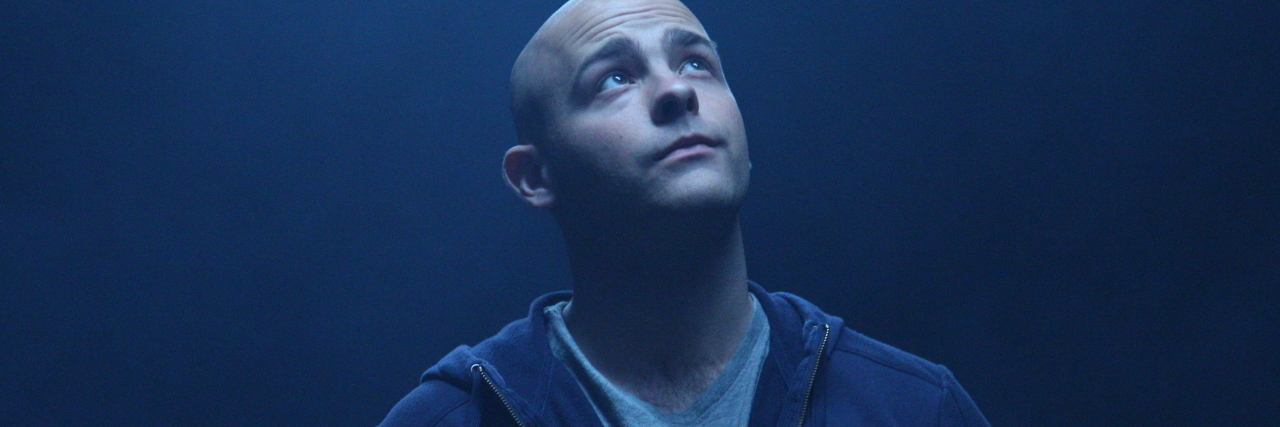It’s 3 a.m. You have to be up at 8. Go to sleep, you dummy.
The inside of my head is a demolition derby for racing thoughts. Doubtful thoughts. Self-deprecation. Questioning yourself about your actions in the past, present and future. What if I never make it? Is this worth it? Am I wasting my 30s?
• What is Bipolar disorder?
This is a normal night for me and lots of creative people with bipolar disorder. This is a good night. Some nights, you are a ball of reckless, nervous energy waiting to explode. It could be worse; I could be in a low, right?
The next morning, I wake up tired. I power through the long day on set with a caffeine-induced vigor. It’s a film set, so it’s exciting, fast-paced and intoxicating. It’s a rush. Everyone is looking to you for answers. You have to have them, when there oftentimes aren’t any. The crew and I are in the heat of the moment of making, and as usual, the day flies by.
I end up in bed, reeling and exhausted physically and mentally. Going over the production inside my head, I fall fast asleep. Quickly and peacefully. Woah, that’s weird. Why is that?
As soon as I wake up the day after a shoot, I have the same ritual. I make coffee, turn on a podcast and review footage. My mind wanders here, usually to a dark place. How long can this last? Will anybody hire me again? Should I get a “real” job?

At this point, the glory of the shoot fades away, as does my mania, and I slip into post-shoot depression. It’s a low because the thrill is over — the highest high of 12 people working together toward a common creative goal. A goal that you thought up one night alone in your underwear while sipping whiskey is now becoming real? What? Do we live in a simulation? This is contrasted with now being alone again in your apartment with nothing but your own dark thoughts.
I feel like there is a similar experience for all creative folks with bipolar. We cycle with the work. It’s a fickle business by nature. It has the highest of highs, both creatively and monetarily, followed by the lowest lows. Dry spells with no inspiration and no paid work leaves you feeling worthless, helpless and useless. Imagine getting fired every two weeks. That’s what it feels like.
I feel like it’s important to be honest about the reality of the creative lifestyle. It’s the same cycle for anyone who is self-employed. Feast or famine. It’s really easy to let this natural cycle influence your mental health. I find myself validating my self-worth with my ability to work. Not employed right now? Not feeling creative? Then you are not valuable. Not having money to pay your rent is one thing, but not knowing where next month’s work is coming from, or how much it will be paying you, is sometimes too overwhelming. Forget not eating this month; will I be able to eat next month?
All this being said, I think we all would say if you are fortunate enough to do something you love for a living, that’s the dream for any creative. That does not mean it’s easy by any stretch of the imagination. Add having a mental illness into the mix? Things get squirrelly.
I have found over the years that the only way to combat the demons inside your own head is through self-care. Eating right, keeping a schedule. Sometimes scaring the demons out with damn near 45-degree angled hill sprint. You do whatever you can to keep the mania and depression at bay. There is a sweet spot where your mania is not in full-tilt, and the depression is repressed. This is what I am for. It’s the productivity zone, and you feel almost invincible. Below are some tips for self-care for anyone creative who is struggling with bipolar disorder or depression:
1. Purpose and passion.
The best thing you can do to alleviate suffering is to give it meaning — a deep meaning tied to your being. This, for me, is expressed by telling stories I’m passionate about. For you, it could look like anything. Writing, drawing, cooking, etc. Find a difficult skill that turns you on and excites you deeply. You should go to bed at night reeling with excitement for the next day, excited to start making things.
2. Catharsis.
Aristotle believed that by experiencing death, love or tragedy in a play or music, we could place ourselves in the stead of the characters and vicariously experience war, famine or loss without having to do so firsthand. It’s a purging of negative emotions through art. This is why horror is popular to this day. I’d take it a step further and say the artist creating anything with emotion is also purging their feelings, and sharing in a communal bath of empathy. Artists give themselves to the work, and in exchange heal, while also seeing those affected by the art mirror their emotions. It’s a deep and transformative process that should be respected.
3. Flow states.
Being inside your own head all the time is scary. “Flow states” allow you to transcend your sense of self, and be completely immersed in a task. All that matters is the doing of the task and the outside world disappears. This could be done with artistic expression, but also any difficult task that requires focus and concentration. I’ve gotten it from drumming, drawing, cooking, boxing, running, shooting rifles at targets and even writing this article. Dive deep into flow states online, and dig into how you can get there for yourself.
4. Education.
It goes without being said, but education is probably one of the most important things you can do for your health. I don’t mean whip yourself into a frenzy of death on medical websites; I mean self-education. Explore yourself, see what triggers you, and start mapping out a productive life structure that helps you avoid those triggers. I’d also say listening to podcasts or reading books has been helpful for me as a human being — period. It takes you out of yourself and forces you to think differently about the world. Perspective is helpful.
5. Routine.
Idle hands are the devil’s plaything. Even when I’m not on a job or busy at all, I’m constantly writing or working on a passion project. I run every other day and work out twice a week. I eat dinner more or less at the same time every day, and I keep my schedule consistent. Living with bipolar, this allows me not to trigger my depression by lack of a schedule. It helps me focus my energies methodically toward things that improve my quality of life rather than detracting from it.
This is one I think more people with mental illness should consider as important as medication. If your body isn’t working correctly, of course you won’t feel your best. Give it the fuel it needs. Healthy greens, lean meats, omega-3 and 6 — all the stuff that helps gut, brain and heart health. Then, use that fuel to make your body move.
7. Be human.
It’s OK not to be OK. What I mean is: allow yourself to be human. If a loved one dies, cry. If your partner breaks up with you, feel sad. If you win a race, feel victorious. If you get a promotion, be proud. Living with bipolar, it’s easy to tell yourself negative feelings or positive feelings are extremes, and you end up living a neutralized life. It’s important to have highs and lows that are natural so you can remain human. Sometimes things suck, so you should feel the suck. Use it as motivation for self-improvement. Tell yourself: “I don’t want to feel like this again,” and take self-care steps to help lower the odds of that feeling happening in your life.
I am not a mental health professional, nor do I have all the answers here. I am experiencing what would be called “recovery” by mental health professionals after years of suffering. Do I still have issues? You bet. Am I trying to be a better person every day I am alive? You bet.
There is no cure-all for bipolar; you just have to mitigate its damaging effects. Creative people are special in that we often look inside ourselves for answers and solutions to practical problems. Use that same skillset to help you cope with your bipolar or depression symptoms. Keep fighting the good fight, and keep the demons at bay.
Follow this journey on the author’s website.
Images via contributor.

